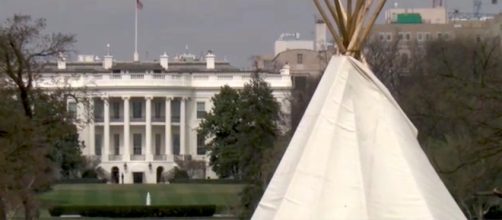Two Native American tribes are holding a four-day Dakota Access Pipeline protest against the Army Corps and President Trump on the National Mall in D.C. this week. Their camp was set up yesterday and this time they’re focusing their efforts on lawmakers who they hope will intervene and stop the Dakota from getting completed. A federal judge also declined the tribes’ request to halt construction based on religious grounds, something Judge Boasberg found dubious given it was never raised.
The two tribes, their supporters, and anti-fossil fuel activists are protesting the Trump administration’s pro-pipeline executive orders, saying the issue was really “about the future of the human race.” From Tuesday to Friday, they’ll have teepees set up with a ceremonial bonfire for Wednesday, ‘informational’ workshops, plus the usual cadre of speakers.
All of which may be moot as the oil could start flowing next week.
A federal judge declined to temporarily stop construction on the final section of the Dakota Access pipeline: https://t.co/MO6upIUz0U
— Maclean's Magazine (@MacleansMag) March 8, 2017
Two-mile march
The Tribe’s attorney said having oil flow under a man-made lake violated their belief the lake was a ‘sacred water’ used in religious practices. There’s just one problem: there are numerous pipelines already running under the Lake Oahe’s bedrock carrying other fossil fuels. And this argument was never brought up in the original suit from last summer.
The four-day fight will culminate in a two-mile march from the Army Corps building to the White House on Friday.
They chose the Army Corps because they manage the Lake Oahe reservoir and gave Energy Transfer Partners the green light to finally finish the project. President Obama caved to special interest groups and told the Army Corps and Energy Transfer Partners to cease all work on the pipeline last year.
#DakotaAccessPipeline demonstration on @WashMonument grounds. Expect 10 tipis & a bonfire starting Wed. @IndigenousRising #NativeNationsRise pic.twitter.com/5MHbe81LX0
— Q McCray (@ABC7Q) March 7, 2017
Two tribes go to war
Despite records showing that multiple meetings took place between government officials and tribal members regarding the pipeline’s route, the two tribes say they were never consulted.
Obama had slow-walked the project, calling for multiple environmental studies that showed the project did not pose a significant risk to the tribes’ watershed.
Tribal members contend the pipeline threatens Native American heritage sites and their water supply, which they use in rituals. The $3.8 billion four-state pipeline was changed numerous times to accommodate these concerns and also rerouted so it didn’t go under the Missouri river. And the federal judge who declined the latest case also said it’s likely tribal members will continue to use the religious defense, which he doesn’t expect to succeed.

